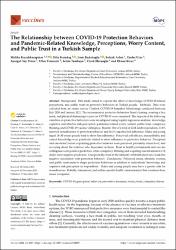| dc.contributor.author | Küçükkarapınar, Melike | |
| dc.contributor.author | Karadağ, Filiz | |
| dc.contributor.author | Budakoğlu, İrem | |
| dc.contributor.author | Aslan, Selçuk | |
| dc.contributor.author | Uçar, Önder | |
| dc.contributor.author | Yay Pençe, Ayşegül | |
| dc.contributor.author | Timurcin, Utku | |
| dc.contributor.author | Tümkaya, Selim | |
| dc.contributor.author | Hocaoğlu, Çiçek | |
| dc.contributor.author | Kiraz, İlknur | |
| dc.date.accessioned | 2023-03-21T11:45:20Z | |
| dc.date.available | 2023-03-21T11:45:20Z | |
| dc.date.issued | 2022 | en_US |
| dc.identifier.citation | Kucukkarapinar, M., Karadag, F., Budakoglu, I., Aslan, S., Ucar, O., Pence, A. Y., Timurcin, U., Tumkaya, S., Hocaoglu, C., & Kiraz, I. (2022). The Relationship between COVID-19 Protection Behaviors and Pandemic-Related Knowledge, Perceptions, Worry Content, and Public Trust in a Turkish Sample. Vaccines, 10(12), 2027. https://doi.org/10.3390/vaccines10122027 | en_US |
| dc.identifier.issn | 2076-393X | |
| dc.identifier.issn | 2076-393X | |
| dc.identifier.uri | https://doi.org/10.3390/vaccines10122027 | |
| dc.identifier.uri | https://hdl.handle.net/11436/7944 | |
| dc.description.abstract | Background: This study aimed to explore the effect of knowledge, COVID-19-related
perceptions, and public trust on protective behaviors in Turkish people. Methods: Data were
collected from an online survey (Turkish COVID-19 Snapshot Monitoring) conducted between
July 2020 and January 2021. The recommended protective behaviors (hand cleaning, wearing a face
mask, and physical distancing) to prevent COVID-19 were examined. The impacts of the following
variables on protective behaviors were investigated using logistic regression analysis: knowledge,
cognitive and affective risk perception, pandemic-related worry content, public trust, conspiracy
thinking, and COVID-19 vaccine willingness. Results: Out of a total of 4210 adult respondents, 13.8%
reported nonadherence to protection behavior, and 86.2% reported full adherence. Males and young
(aged 18–30 years) people tend to show less adherence. Perceived self-efficacy, susceptibility, and
correct knowledge were positively related to more adherence to protective behavior. Perceptual
and emotional factors explaining protective behavior were perceived proximity, stress level, and
worrying about the relatives who depended on them. Trust in health professionals and vaccine
willingness were positive predictors, while conspiracy thinking and acquiring less information (<2,
daily) were negative predictors. Unexpectedly, trust in the Ministry of Health showed a weak but
negative association with protection behavior. Conclusions: Perceived stress, altruistic worries,
and public trust seem to shape protection behaviors in addition to individuals’ knowledge and
cognitive risk perception in respondents. Males and young people may have a greater risk for
nonadherence. Reliable, transparent, and culture-specific health communication that considers these
issues is required. | en_US |
| dc.language.iso | eng | en_US |
| dc.rights | info:eu-repo/semantics/openAccess | en_US |
| dc.subject | COVID-19 | en_US |
| dc.subject | Perception | en_US |
| dc.subject | Behavior | en_US |
| dc.subject | Preventive measures | en_US |
| dc.subject | Worry | en_US |
| dc.subject | Trust | en_US |
| dc.subject | Conspiracy theory | en_US |
| dc.title | Behaviors and pandemic-related knowledge, perceptions, worry content, and public trust in a Turkish sample | en_US |
| dc.type | article | en_US |
| dc.contributor.department | RTEÜ, Tıp Fakültesi, Dahili Tıp Bilimleri Bölümü | en_US |
| dc.contributor.institutionauthor | Hocaoğlu, Çiçek | |
| dc.identifier.doi | 10.3390/vaccines10122027 | en_US |
| dc.identifier.volume | 10 | en_US |
| dc.identifier.issue | 12 | en_US |
| dc.identifier.startpage | 2027 | en_US |
| dc.relation.journal | Vaccines | en_US |
| dc.relation.publicationcategory | Makale - Uluslararası Hakemli Dergi - İdari Personel ve Öğrenci | en_US |


















